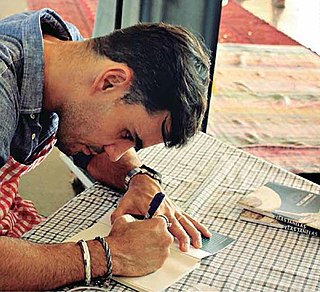
Lygia Fagundes da Silva Telles, also known as "the lady of Brazilian literature" and "the greatest Brazilian writer" while alive, was a Brazilian novelist and writer, considered by academics, critics and readers to be one of the most important and notable Brazilian writers in the 20th century and the history of Brazilian literature. In addition to being a lawyer, Lygia was widely represented in postmodernism, and her works portrayed classic and universal themes such as death, love, fear and madness, as well as fantasy.

Antônio Drauzio Varella is a Brazilian physician, educator, scientist and medical science popularizer in the press and TV, as well as best-selling author. In addition to medicine, Varella is a public commentator on issues such as prison conditions, social welfare, government, literature and his professed atheism and skepticism, and has frequently debunked pseudoscientific medical claims.

Ignácio de Loyola Brandão is a Brazilian writer, perhaps best known as the author of the dystopian science-fiction novel Zero; the story of Brazil in the 1960s under a totalitarian regime. In 2008, he was awarded the Prêmio Jabuti for his novel O Menino que Vendia Palavras.

Eduardo Giannetti da Fonseca is a Brazilian economist and author, educated at the University of São Paulo, with specialization in Social Science, Economics, Administration, and Accounting.

João Almino is a Brazilian novelist. He is the author of The Brasília Quintet, which consists of the novels Ideas on Where to Spend the End of the World, Samba-Enredo, The Five Seasons of Love ; The Book of Emotions and Cidade Livre. His 2015 novel Enigmas da Primavera was published in English in 2016 by Dalkey Archive Press and won the Jabuti Award for Best Brazilian Book in translation. His seventh novel was published in November 2017 in Brazil: Entre facas, algodão. His most recent novel, Homem de Papel, was published in 2022. He has also authored books of philosophical and literary essays. He taught at the National Autonomous University of Mexico (UNAM), at the University of Brasília (UnB), the Instituto Rio Branco, Berkeley, Stanford and The University of Chicago. In 2017, he was elected as one of the 40 members of the Brazilian Academy of Letters.
Rosanne Santos Mulholland is a Brazilian actress and writer.

Luiz Fernando Ruffato de Souza is a contemporary Brazilian writer. An alumnus of the Federal University of Juiz de Fora in the Brazilian state of Minas Gerais, Ruffato worked as a journalist in São Paulo and published several fiction books, including História dos Remorsos e Rancores (1998) and Eles eram muitos cavalos (2001). The latter garnered the APCA literary prize.

Aílton Graça is a Brazilian actor, scenographer, ballet dancer and clown.

Boris Fausto was a Brazilian historian, political scientist and writer.

Pedro Bandeira de Luna Filho is a Brazilian award-winning and best-selling children's novelist and poet, best known as the author of the Os Karas hexalogy of mystery novels which comprise A Droga da Obediência (1984), Pântano de Sangue (1987), Anjo da Morte (1988), A Droga do Amor (1994), Droga de Americana! (2001) and A Droga da Amizade (2014).

José Carvalho is a Brazilian screenwriter, script doctor and dramaturgy professor. He has written scripts for the big and small screens since the early 90s. Some of his most well-known works include Castelo Rá-Tim-Bum, Bruna Surfistinha, Faroeste Caboclo and the classic soap opera Xica da Silva. With an MA in Literature from PUC-Rio, Carvalho has taught courses at not only his alma-mater, but also renowned Brazilian production houses such as O2 Filmes and Globo.

Carola Saavedra is a Chilean-born Brazilian writer.

Susana Schnarndorf Ribeiro is a Brazilian Paralympic swimmer. In 2005, after a lengthy triathlon career, at the age of 37, Schnarndorf began to experience the first symptoms of a mysterious degenerative disease that was later diagnosed as multiple system atrophy (MSA). After a break from professional athletics, Schnarndorf returned to the sports world as a swimmer and is presently a member of the Brazilian Paralympic Swimming Team.

Juliano Cazarré is a Brazilian actor and writer. He appeared in more than thirty films since 2002.

Luis Felipe Machado de Oliveira is a Brazilian journalist, writer and musician. He is currently the Communications Director for Worldfund, a nonprofit organization with educational projects. His journalistic career includes leading positions at a few of Brazil's most relevant media companies, such as O Estado de S. Paulo, R7 and Diário de S.Paulo. As a writer, he produced two novels, two non-fiction works and an award-winning children's book.
Evandro Affonso Ferreira is a Brazilian writer.

Lucio Luiz is a Brazilian journalist, writer, editor, podcaster and comics author. He holds a degree in Journalism and has Master's degree and Doctorate in Education.

Renata Pallottini or Renata Monachesi Pallottini was a Brazilian playwright, essayist, poet, theater professor and translator. She was an award-winning author of poetry, plays, essays, fiction, children's literature, theater theory, and television programs who was notable in the Brazilian literary and theater scenes. In a considerable part of her production, it is possible to identify the questioning and the combat against the social values that delimitated the woman's role in society.

Nabil Georges Bonduki is a Brazilian architect, urban planner, university professor, author, and politician. He holds the position of Full Professor of Urban Planning at the University of São Paulo (USP) and serves as a visiting professor at the University of California, Berkeley.

















